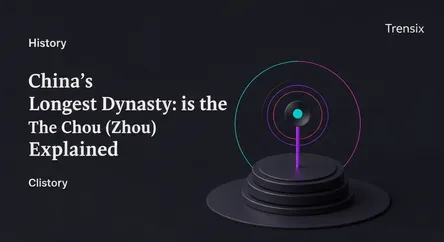History
China's Longest Dynasty: The Chou (Zhou) Explained

Discover the Chou (Zhou) Dynasty, the longest in Chinese history, which established foundational philosophies and political concepts still relevant today.
What is it?
The Chou Dynasty, more commonly known as the Zhou Dynasty (c. 1046–256 BCE), holds the record as the longest-reigning dynasty in Chinese history. It is divided into two main periods: the Western Zhou (1046–771 BCE) and the Eastern Zhou (771–256 BCE), which is further subdivided into the Spring and Autumn Period and the Warring States Period. The dynasty was founded by the Ji family, who overthrew the Shang Dynasty. A pivotal concept they introduced was the "Mandate of Heaven" (Tianming), which posited that rulers were granted the right to rule by a divine power, but could lose this right if they governed unjustly. This idea would legitimize dynastic changes for centuries.
Why is it trending?
The Zhou period remains a subject of great interest because it was the crucible for much of Chinese civilization. This era saw a golden age of Chinese philosophy, giving rise to the "Hundred Schools of Thought." The most enduring of these are Confucianism and Taoism, founded by Confucius and Laozi respectively. These philosophical systems continue to be foundational to East Asian culture, ethics, and social norms. The period's political and technological innovations, including advancements in iron casting, large-scale irrigation projects, and military strategy as detailed in Sun Tzu's "The Art of War," are continually studied for their historical and contemporary significance.
How does it affect people?
The legacy of the Zhou Dynasty profoundly affects people today, primarily through its philosophical and political contributions. Confucianism's emphasis on filial piety, social harmony, and moral ethics continues to shape personal relationships and societal structures in China and beyond. Taoism's principles of living in harmony with nature influence everything from traditional Chinese medicine to modern wellness practices. The political concept of the Mandate of Heaven, linking a ruler's legitimacy to their virtue and performance, has echoed throughout Chinese history and offers a cultural framework for understanding political accountability. Essentially, the ideas born from this ancient dynasty helped wire the cultural and philosophical software of a major part of the modern world.